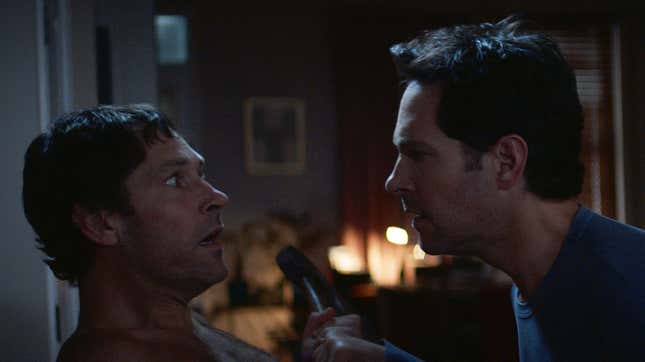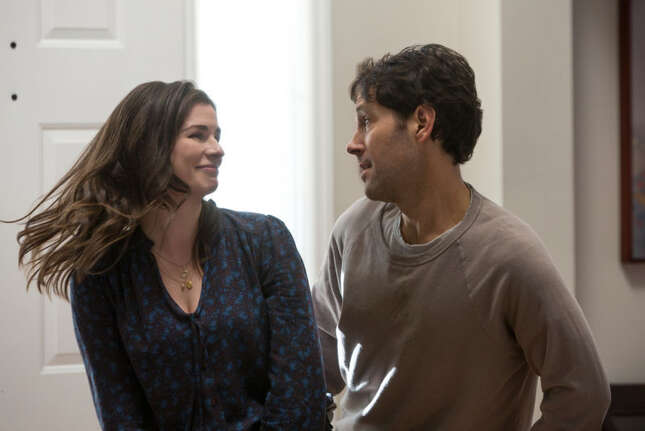
Somewhere out in the vast forests of television development, you’ll find the corpses of the Charlie Kaufman pilots that never made it to series. The un-produced scripts from his pre-Being John Malkovich breakout, written among stints on cult favorites like Get A Life and The Dana Carvey Show. The post-Synecdoche, New York team-up with Catherine Keener that was set up during a fruitful time of development at HBO, but never came to be. The adaptation of a novel about a haunted IKEA-like store that he helped assemble, but was eventually passed to Josh Schwartz. And then there’s the closest we ever got to seeing what a TV show made by the guy who wrote Eternal Sunshine Of The Spotless Mind and Anomalisa might look like: How And Why, starring Keener, Michael Cera, and Sally Hawkins in the story of someone “who can explain how and why a nuclear reactor works but is clueless about life.” FX passed on that one in 2014.
Or at least that used to be the closest thing we ever got to a Charlie Kaufman TV show. Today, we have Living With Yourself, the new Netflix cloning comedy that throws the high concepts, themes, and novelty of the Kaufman filmography into a salad spinner to produce a weekend binge with the shelf-life of a potluck caprese. There’s a charismatic leading man pulling onscreen double duty (like Adaptation), science-fiction technology hiding behind a nondescript storefront (like Eternal Sunshine), and all the midlife, upper-middle-class-white alienation and ennui you can stomach (like… every Kaufman movie.) A lot of the jokes land, and the volume of Paul Rudd charm truly increases with the volume of onscreen Rudd, but it’s hard to shake the feeling that this is all just Netflix tiding its subscribers over until a genuine Kaufman—his take on I’m Thinking Of Ending Things—arrives in their feeds.
That’s not to say Living With Yourself can’t be enjoyed on its own merits. It’s an intriguing work of low-budget, minimal-flash sci-fi, impressively seamless in its Rudd-on-Rudd scenes. Its “guy in a rut winds up with exact genetic duplicate” premise raises interesting questions about work, romantic relationships, and gratitude. The “new and improved” copy of middle-aged, former branding whiz Miles (Rudd) presents a sophisticated analogy for the better versions of ourselves we project online and in social situations (eventually running headlong into a dating-app subplot), and a less-than-sophisticated parallel to the difficulty Miles and his wife, Kate (Aisling Bea), are having with conceiving a child. Its storytelling methods are enticing, too: A shifting POV that might create a mystery in one episode and solve it the next, rewinding and unwinding the timeline of Miles’ scientific mishap in order to replay crucial scenes from multiple angles.
But that’s a lot of window dressing gussying up an over-told tale: A dead-end job, a crumbling marriage, a protagonist learning that he has a pretty good life, all things considered. Miles is a real drip, and Living With Yourself, to its credit, realizes this. These eight episodes are less about getting him back to a place where he’s not shambling through work presentations and brushing off reminders from Kate, and more about reinforcing the fact that even the most ordinary existences have something to envy about them. That’s particularly true when the one doing the envying is a clone who was grown in a retro-futuristic “spa” and endowed with his predecessor’s memories.
The “other” Miles, then, really anchors Living With Yourself. “Your very existence is a crime,” he’s told early on, an anxious charge suddenly shooting through a show that previously earned a laugh with a cameo by one of the cloning facility’s other clients: uncannily invulnerable New England Patriots quarterback Tom Brady. He’s a man with someone else’s experiences in his head and no history of his own, and that gives Rudd some complicated notes to play within the clone’s otherwise easygoing vibe. There’s evident narrative strain to Living With Yourself’s later episodes, but that’s never the case when the clone is tapping into some of his darker impulses.

The concepts are sound; it’s the execution that’s lacking. Little Miss Sunshine directors Jonathan Dayton and Valerie Faris establish a relatively mundane visual palette, perhaps limited by the requirements of stitching Rudd’s separate takes together in post-production. Despite a standalone episode and a properly conflicted performance by Bea, Kate still winds up primarily a reflection of Miles Prime’s failings. There’s almost no reason for Alia Shawkat and Jon Glaser to show up as Miles’ sister and her partner, respectively, other than to be Alia Shawkat and Jon Glaser. But hey: There are multiple chances for Rudd to remind you what a funny dancer he is.
And there’s that nagging sense that whatever the show tries, somebody else has already done it better. This isn’t a case of Joker battering its audiences over the head with specific Scorsese homages; Living With Yourself lives in the uncanny valley of recommended-if-you-like. The unfortunate irony of this show about copying people is that it itself feels like an inferior knockoff, a genial lark that can’t help but fall short of the soul, wit, and creative ingenuity of the thing it’s unconsciously echoing. You’ll never get to see all those Charlie Kaufman TV shows. But will you even remember watching Living With Yourself?